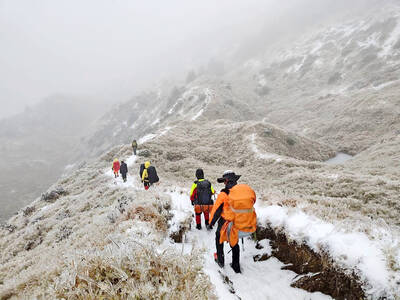The Department of Health (DOH) decided yesterday to revoke the license of a nurse who mistakenly killed a baby by administering the wrong vaccine at a Taipei hospital on Friday.
"Although she committed the mistake inadvertently, we have decided to revoke her license," said acting head of the DOH Twu Shiing-jer (
Huang Ching-hui (
"The DOH will also fine hospital director Hsu Mu-chan (
Since the tragedy, Twu has visited the surviving injection victims and convened an emergency meeting with medical professionals discussing how to prevent similar mishaps.
"To prevent similar situations, it is very important for all hospitals to establish efficient incident reporting systems," said Twu.
Although Hsu insisted the incident was caused by Huang, Twu said the tragedy was not a mistake by just one person.
"It is the problem of how the hospital operates its vaccine control system," said Twu, adding it is also vital for the hospital to establish a system that will enable it to correct errors.
According to investigations, the mix-up occurred because Atracurium was placed in the same basket as hepatitis B vaccines.
Asked if the hospital should be shut down, Twu said it is the hospital's decision.
"It is a big local hospital. Shutting it down would cause a lot of inconvenience for local people," said Twu.
Twu also addressed the issue of nurse training following reports that Huang administered the wrong vaccines because she was unable to read the English notes on the bottles.
He said it was an important factor that was being closely looked at by the government
Meanwhile, Chin Tseng Jean-lie (
"If the DOH wants nurses to join the training sessions, nurses will need extra days off," Chin Tseng said.
According to Chin Tseng, nurses cannot afford to spend more time on training because of their already packed schedule.
Meanwhile, hospital sources reported yesterday the six babies who survived receiving the wrong injections are recovering.

Trips for more than 100,000 international and domestic air travelers could be disrupted as China launches a military exercise around Taiwan today, Taiwan’s Civil Aviation Administration (CAA) said yesterday. The exercise could affect nearly 900 flights scheduled to enter the Taipei Flight Information Region (FIR) during the exercise window, it added. A notice issued by the Chinese Civil Aviation Administration showed there would be seven temporary zones around the Taiwan Strait which would be used for live-fire exercises, lasting from 8am to 6pm today. All aircraft are prohibited from entering during exercise, it says. Taipei FIR has 14 international air routes and

The Ministry of National Defense (MND) today released images of the military tracking China’s People's Liberation Army (PLA) movements during the latest round of Chinese drills around Taiwan. The PLA began "Justice Mission 2025" drills today, carrying out live-fire drills, simulated strikes on land and maritime targets, and exercises to blockade the nation's main ports. The exercises are to continue tomorrow, with the PLA announcing sea and air space restrictions for five zones around Taiwan for 10 hours starting from 8:30am. The ministry today released images showing a Chinese J-16 fighter jet tracked by a F-16V Block 20 jet and the

Snow fell on Yushan (Jade Mountain, 玉山) yesterday morning as a continental cold air mass sent temperatures below freezing on Taiwan’s tallest peak, the Central Weather Administration (CWA) said. Snowflakes were seen on Yushan’s north peak from 6:28am to 6:38am, but they did not fully cover the ground and no accumulation was recorded, the CWA said. As of 7:42am, the lowest temperature recorded across Taiwan was minus-5.5°C at Yushan’s Fengkou observatory and minus-4.7°C at the Yushan observatory, CWA data showed. On Hehuanshan (合歡山) in Nantou County, a low of 1.3°C was recorded at 6:39pm, when ice pellets fell at Songsyue Lodge (松雪樓), a

NO SHAME IN RETREAT: Hikers should consider turning back if the weather turns bad or if they do not have sufficient equipment, the Taroko park headquarters said Two people died of hypothermia over the weekend while hiking on Hsuehshan (雪山), prompting park authorities to remind hikers to bring proper equipment and consider their physical condition before setting out in the cold weather. Temperatures dropped over the weekend, bringing snow to high altitudes in Shei-pa National Park. One hiker, surnamed Lin (林), who on Friday was traveling with a group of six along the Hsuehshan west ridge trail, lost consciousness due to hypothermia and died, the Shei-pa National Park Headquarters said. On Saturday, another hiker, surnamed Tien (田), in a group of five on the southeast of the west